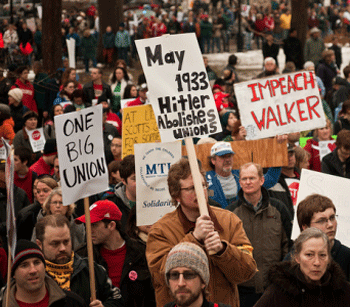
There are some things you just never expect to see. Shrimp ice cream. World peace. An openly gay republican president.
Or, workers in the United States facing the loss of their collective bargaining rights.
“The right to bargain collectively is at the bottom of social justice for the worker, as well as the sensible conduct of business affairs. The denial or observance of this right means the difference between despotism and democracy.” Franklin Delano Roosevelt, in an address to the Senate, May 8, 1937.
These rights have been a mainstay of US labor law for nearly 80 years, first coming into being as part of Roosevelt’s New Deal legislation in the National Industrial Recovery Act of 1933 – later codified as the National Labor Relations Act (NLRA).
Public employees gained bargaining rights somewhat later – in the case of Wisconsin, about 60 years ago.
Now the government didn’t just grant employees the right to organize out of benevolence; no, these rights were hard won with the blood of workers.
The 50 years leading up to Roosevelt’s New Deal were filled with costly and often exceptionally violent strikes. Many workers and not a few scabs died. Employers lost millions in productivity.
It was under this backdrop, that workers gained the right to organize. It was seen solely as a means to avoid bloodshed and the costly loss of productivity. Bargaining rights were not something given; the rights were hard-earned with the blood of countless workers – and that’s a very important distinction.
The first section of the NLRA says it all:
“Experience has proved that protection by law of the right of employees to organize and bargain collectively safeguards commerce from injury, impairment, or interruption, and promotes the flow of commerce by removing certain recognized sources of industrial disputes arising out of the differences as to wages, hours or other working conditions, and by restoring equality of bargaining power between employers and employees.”
Something your forefathers fought and died for, bought and paid for with their blood, something which has endured for such a long time, is not something you expect to see change. Particularly in this supposedly enlightened age.
But Governor Walker’s changes wipe all that out for Wisconsin public employees. Mr. Walker would do away with public employee unions.
Make no mistake, the changes on the table in Wisconsin would very much do away with public employee unions. Two key provisions insure that, by:
- Outlawing current union shops – where all employees in a bargaining unit must join the union or pay equivalency fees to the union for their fair share of the cost of representation, and
- Mandating automatic decertification elections every year, where the unions have to win a 51% majority of all employees in the bargaining unit – not just a simple majority of those voting.
No union could exist with conditions like that.
So if the law passes, then there will be no more public employee unions in Wisconsin. None. They’ll be dead.
The unions have already agreed to the wage and benefit cuts, but Governor Walker still presses on with his agenda. So it’s crystal clear that the budget mess they’re in is all just a facade for the real agenda – busting the unions.
There are eight other states with similar legislation on the table right now. If Wisconsin is successful in busting their unions, then the other states will surely follow. All of them.
So after public employee unions are decimated, what next? I don’t think the Tea Party and their right-wing cohorts are going to stop with public employees.
Public employee unions are the core strength of the union movement in the United States, with 36% of all public employees belonging to unions. That compares to just 6.9% of all private sector employees.
It’s clear that after they’ve decimated the strength of the union movement, they’ll start mopping up exercises to do away with the rest.
The events we’re watching unfold could well be the beginning of the end of the union movement as we know it in the United States.
I can see the Koch brothers wringing their hands in happy orgiastic, anticipation.
So are we going to stand idly by and let this happen?
The remedy for the situation labor finds itself in is obvious.
Labor needs to get in touch with its roots, circa the late 1800’s through the early 1900’s.
We need to return to the methods of our forefathers. Time proven methods. And Governor Walker and the others need to be thoroughly and completely educated on the reasons precisely why collective bargaining laws exist, and the full range of possibilities of what can happen when the laws are suddenly gone.
“The tree of liberty needs to be watered from time to time with the blood of patriots and tyrants.” Thomas Jefferson.
Jefferson hit the nail on the head. I for one will not go quietly.
